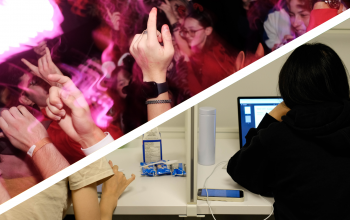Photo Credit: Joshua Chua, Unsplash
How has the University of Toronto responded to the toll of COVID-19 on the mental health of students
Isabelle Buchanan, Features Editor
University is a stressful place; with exams, deadlines, extracurriculars, jobs, all while trying to figure out your future. Especially at a top university like the University of Toronto (U of T), where overachieving students often create an environment of hostile competition, mental health services are crucial.
Over the past few years, U of T has witnessed a rise in mental health concerns among its students, and the community has been deeply saddened by the large amount of suicides and attempts. Outraged students have responded to these events, speaking out against U of T’s lack of mental health services, and demanding for change.
As one of the leading research institutions on COVID-19, U of T has actually released studies explaining the effects this global pandemic has on our mental health. One study showed how being isolated and staying home has caused people to be more anxious, feel less in control of their life, be less motivated, and perform worse on their work. This study also discusses some ways to mitigate these consequences, highlighting the importance that institutions and supervisors or professors play in alleviating anxieties.
These effects are seen in students globally, who have spoken out against the impersonal experience of online learning, and are struggling to complete their course loads to their typical standards. One would expect that a leading research university, like U of T, who has experienced pleas from students to increase mental health services in the past, would understand these consequences and take steps to mitigate the effects, right? So here is the million dollar question: What has U of T done to support their students’ mental health, especially with the added stressors of a global pandemic and online learning?
When I started writing this article, I thought it would be fairly easy to discuss the steps taken by our institution to provide its students with better mental health services. However, I quickly realized that I really was not aware of what the university has done. That is the first problem with U of T’s services: the lack of communication with its students. In fact, thinking back, most of the information I learned about their services has been through other students’ social media, often in response to tragic events on campus. While we are grateful for the actions of these students, it is not okay that students are seemingly doing more than our university.
Realizing I really do not know much about the services provided by U of T, I began my research. To my dismay, their websites were not very accessible either. This seems to be a trend at U of T; at this point, it does not matter if U of T provides state of the art services if students cannot even figure out what services are offered. This is something that needs immediate attention.
Finally, I came across an article from the beginning of 2020, explaining steps taken in response to the student outrage. U of T teamed up with the Centre for Addiction and Mental Health (CAMH), Canada’s largest mental health teaching hospital. Working with students, U of T and CAMH have partnered to create a plan to provide better services to U of T students. I must say, I was pleasantly surprised to hear about this partnership, and I believe this is a good first step taken by the university.
This partnership has led to a few initiatives, including the My Student Support Program (SSP), drop-in counselling during exam season, and asking for backing from the government. The SSP is a text-and-chat hotline, that allows students to text a professional counselor about depression, anxiety, stress, or loneliness, in complete confidentiality. The SSP is available 24/7 and in 35 languages, making it an easy and accessible service for UofT students. Further, UofT has added drop-in counselling at Robarts Library during exam seasons, to help students relieve stress. They also offer Mindfulness Moments, and pet-therapy sessions during exams.
These programs are great, and can offer important short-term support to students. However, there remain a few problems. Firstly, communication remains an issue: a service is not useful if many students are not aware it exists. Further, both of these offer short-term support. Unfortunately, many students struggle with mental health issues that need more attention than these services are able to provide. U of T needs to find innovative ways to market their services, and make them accessible to students, as well as provide more medium to long-term services. Finally, both of these services were implemented before the pandemic.
U of T mental health services have yet to respond to the additional effects COVID-19 has had on students’ mental health. The one thing that U of T has done was move their services online. While this makes it easier for students to access their services, especially those who might not be in Toronto this semester, this response is seriously lacking. U of T has access to some of the best minds, and has received suggestions from both students and the CAMH about providing better services to students. They really should be doing more. There is only so much we can do as students, and we have made our dissatisfaction clear. U of T should be taking more initiatives, especially during the pandemic, to ensure the safety of their students.




